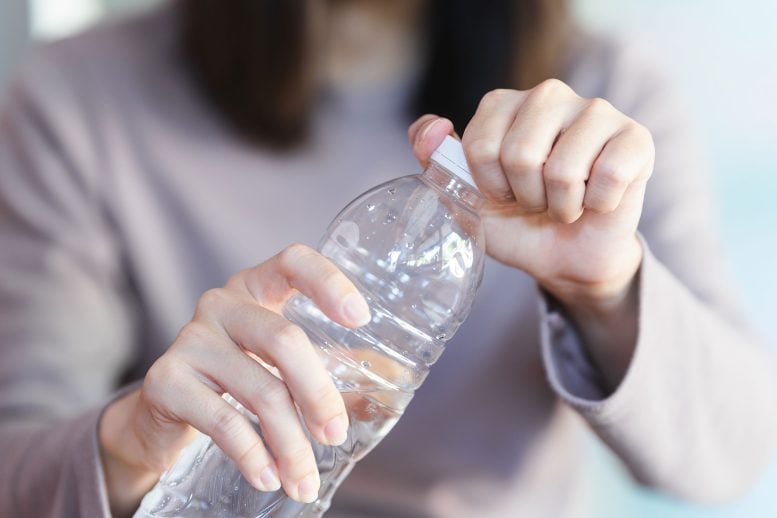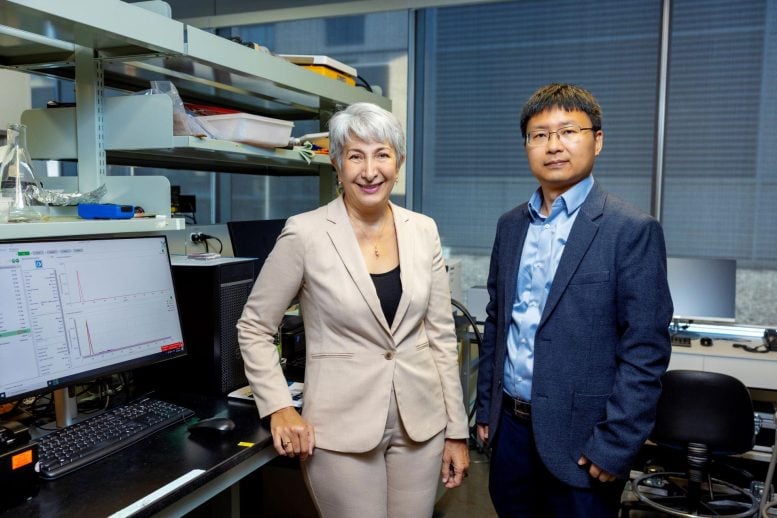
Using it regularly introduces tens of thousands of microplastic and nanoplastic particles into the body each year.
The tropical beauty of Thailand’s Phi Phi islands is not the kind of place where most PhD journeys begin. For Sarah Sajedi, however, it was not the beaches themselves but what lay beneath them that sparked her decision to leave a career in business and pursue academic research.
“I was standing there looking out at this gorgeous view of the Andaman Sea, and then I looked down and beneath my feet were all these pieces of plastic, most of them water bottles,” she says.
“I’ve always had a passion for waste reduction, but I realized that this was a problem with consumption.”
Sajedi, BSc ’91, decided to return to Concordia to pursue a PhD with a focus on plastic waste. As the co-founder of ERA Environmental Management Solutions, a leading provider of environmental, health, and safety software, she brought decades of experience to compliment her studies.
Her latest paper, published in the Journal of Hazardous Materials, looks at the science around the health risks posed by single-use plastic water bottles. They are serious, she says, and seriously understudied.
Sarah Sajedi with Chunjiang An: “Drinking water from plastic bottles is fine in an emergency but it is not something that should be used in daily life.”
Tiny threats, little known
In her analysis of more than 140 scientific papers, Sajedi reports that people ingest an estimated 39,000 to 52,000 microplastic particles each year. For those who rely on bottled water, that number climbs even higher—about 90,000 additional particles compared to individuals who primarily drink tap water.
These particles are invisible to the eye. Microplastics range in size from one micron (a thousandth of a millimeter) to five millimeters, while nanoplastics are smaller than a single micron.
They are released as plastic bottles are manufactured, stored, transported, and gradually degrade. Because many bottles are made from low-grade plastic, they shed particles whenever they are handled or exposed to sunlight and changes in temperature. Unlike plastics that move through the food chain before entering the human body, these are consumed directly from the container itself.

According to Sajedi, the health risks are significant. Once inside the body, these small plastics can pass through biological barriers, enter the bloodstream, and reach major organs. Their presence may contribute to chronic inflammation, cellular oxidative stress, hormone disruption, reproductive issues, neurological damage, and some cancers. Still, their long-term impacts are not fully understood, largely because of limited testing and the absence of standardized ways to measure and track them.
Sajedi also outlines the range of methods available to detect nano- and microplastics, each with benefits and limitations. Some approaches can locate particles at extremely small scales but cannot reveal their chemical makeup. Others identify the material composition but overlook the tiniest plastics. The most sophisticated and dependable tools are often prohibitively expensive and not widely accessible.
Education is the best prevention
Sajedi is encouraged by the legislative action that has been adopted by governments around the world aimed at limiting plastic waste. However, she notes that the most common targets are single-use plastic bags, straws, and packaging. Very few address the pressing issue of single-use water bottles.
“Education is the most important action we can take,” she says. “Drinking water from plastic bottles is fine in an emergency but it is not something that should be used in daily life. People need to understand that the issue is not acute toxicity—it is chronic toxicity.”
Reference: “Unveiling the hidden chronic health risks of nano- and microplastics in single-use plastic water bottles: A review” by Sarah Sajedi, Chunjiang An and Zhi Chen, 14 June 2025, Journal of Hazardous Materials.
DOI: 10.1016/j.jhazmat.2025.138948
Funding: Natural Sciences and Engineering Research Council of Canada
Never miss a breakthrough: Join the SciTechDaily newsletter.
Follow us on Google, Discover, and News.
27 Comments
I am concerned about about plastic use and potential health risks. Please keep me informed.
i’ll do my best Amanda.
What about a water cooler.Are they safer?
Yeah, me too!
Water in my state water has a smell and awful taste, I use a pur counter and faucet attachment filter they doesn’t help much. I got to the point were I just couldn’t drink any more water from my pur filtering system. I buy bottle water and drink 100oz plus besides my one cup of coffee. I hardly drunk soda etc. Am I concerned about micro plastic etc yes 100 percent. What else can I do. I’m 69 yrs old female… And I know as we get older us senior don’t drink as much as we should.
It’s always the same, in literally every article about this subject: “this is really bad but um actually we don’t actually know how bad or even if it is actually bad, but yeah it sounds scary so it could be real bad for you, this plastic stuff that’s literally everywhere!
Will using a Life Straw with a plastic bottle be the right move?
Im worried about more immediate and long term effects of chlorine and lead and manganese and other additions to tap water like natural and artificial florination heavy metals.
This is an OPINION PAPER. It is not based on science. She says all people get 30k-50k, but if you drink bottled water it jumps to 90k. Where is the PROOF? Do a proper study of 500,00 people who don’t drink water from plastic bottles (the 3rd world world be easy) vs 500k who drink from plastic water bottles. Is it 90k?
Reference: “Unveiling the hidden chronic health risks of nano- and microplastics in single-use plastic water bottles: A review” by Sarah Sajedi, Chunjiang An and Zhi Chen, 14 June 2025, Journal of Hazardous Materials.
Why do you think those numbers are opinions? She’s a scientist.
Tap water has pfas, sugary drinks cause diabetes and cardiovascular disease, bottle water has microplastic, canned waters is lined with plastic, boxed waters is lined with plastic, proper filtration systems cost thousands to install and maintain, honestly what do you even expect people to do with this information? live your life, be positive, pick your poison. We’re all gonna die sometime.
Ridiculous. Any study on bottled water must also include bottled sodas, fruit juices, etc.
Based.
The dangers of plastic has been known about for decades & the global industry producing such materials have done little to make their product safe & all the while with the willing assistance of our lawmakers . . .
The whole planets water cycle has been heavily adulterated with man made material & the majority of water filtration systems commercially available use plastic filters as does the osmosis method, which all undoubtedly contribute further adulteration’s to humanity’s fresh drinking water supply’s . . .
It’s something that is effecting all life forms on earth & still isn’t being addressed by our lawmakers, who seem to have the best medical provisions subsidized by the people not for the people . . .
I find that among people I know, people not drinking bottled water have more health issues than people drinking bottled water.
Where my dad lives, the city itself has declared it’s not safe to use the tap water because of excessively high micro-plastics and encourage using bottled water or boiling all water- be for cooking, cleaning, bathing, drinking, etc.
So what then? Are they supposed to drink creek water or something? Cause even that had micro-plastics these days.
Where’s my comment? Too spicy?
PFAS or plastic? Nestle and stretchin dating?
Oh I forgot, when you are deciding between PFAS and plastic, there is a street in Galesburg where EVERYONE has cancer the whole street. (Probably avoid tap water)
The crap that comes outta my faucet? Its brown water Trust me u would rather drink bottled water any day so my question is what the heck do u drink then?
How many of us have turned from tap water risks to large 5 gallon tanks that go thru layers of filtration in a response to tap water concerns now to find these plastic jugs are another danger? There seems to b no alternative left. Another environmental issue among so many. Nothing is safe anymore
With AI and all efforts to produce cheaper consumer products and food to charge more money; human cancers are envidentable.
So take my chances with microplastics which are in everything and knowingly given to everyone no matter what or drink tap water? That’s the choice? I wouldn’t drink the tap water if you paid me anymore. The amount of crap in that outweighs the microplastics. Instead the water companies that bottle the water should get busy figuring out how to reduce the microplastics. They have the money. Instead, if this drink the kool-aid article.
So is that bad to drink out of plastic bottles especially when you on holiday I use this.
As terrible as this sounds, one has to keep in mind that plastics has been with us for over a century and a half. Yet at that same period life expectancy only grew and health outcomes largely improved accross the board.
So whatever bad the microplastics can do, it’s not taking a noticeable toll on general population.
Seems to me that reverse osmosis should filter out nano and bigger particles, but would the osmosis membrane clog quickly?